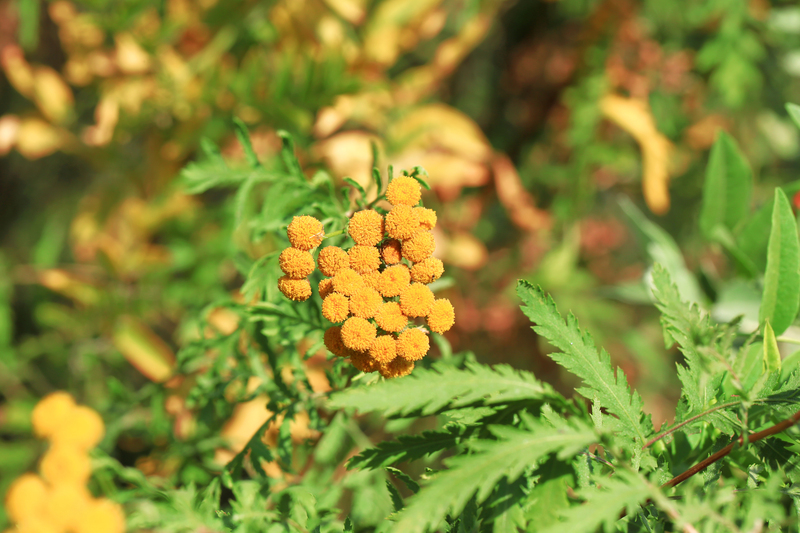Begin Your Gardening Odyssey with These 9 Essential Tips
Posted on 18/08/2025
Begin Your Gardening Odyssey with These 9 Essential Tips
Are you ready to embark on your gardening journey but uncertain where to start? Whether you have a sprawling backyard or a modest balcony, gardening can enrich your life, bringing beauty, fresh produce, and a sense of accomplishment. Beginning a gardening odyssey can feel overwhelming, but with the right guidance and knowledge, you'll be cultivating vibrant, thriving plants in no time. In this comprehensive article, discover 9 essential gardening tips tailored for novice gardeners. These tips will help you start with confidence, build a solid foundation, and enjoy lasting success in your garden.
Table of Contents
- Understand Your Space and Climate
- Plan Your Garden Wisely
- Choose the Right Plants for Beginners
- Prepping Your Soil: The Foundation of Success
- Watering: The Lifeblood of Your Garden
- Mulch: The Gardener's Secret Weapon
- Feed Your Plants Properly
- Pest Management and Prevention
- Practice Patience & Celebrate Small Wins
1. Understand Your Space and Climate
Every successful gardening adventure begins by understanding your unique environment. Before planting anything, take time to analyze your available space and climate. Here's how:
- Observe sun patterns: Notice where sunlight falls and for how long. Many plants require 6-8 hours of direct sunlight daily.
- Test your soil type: Sandy, loamy, and clay soils have differing needs. Simple home tests can reveal if your soil is acidic or alkaline.
- Know your growing zone: The USDA Plant Hardiness Map helps you select plants suitable for your regional temperature range.
- Access to water: Consider how you'll efficiently water your garden, whether by hose, watering can, or automated system.
By recognizing your garden's specific characteristics, you'll be better equipped to choose suitable plants and gardening methods that thrive in your environment.
2. Plan Your Garden Wisely
Effective planning lays the groundwork for a flourishing garden. A well-thought-out plan prevents overcrowding, maximizes space, and simplifies maintenance. Here are essential garden planning tips:
- Sketch your space: Create a simple map of your garden, marking areas that receive full sun, partial shade, or shade.
- Decide what to grow: Choose between flowers, vegetables, herbs, or a mix depending on your interests and needs.
- Consider container gardening: Limited on space? Containers are ideal for patios, balconies, or even windowsills.
- Plan for growth: Space plants according to their mature size, not their size at planting. Crowded gardens can suffer from disease and poor air flow.
*Remember*, a little time spent planning in the beginning will save countless hours and headaches later on your gardening odyssey.
3. Choose the Right Plants for Beginners
Starting with the right plants can make all the difference for new gardeners. Some plants are more forgiving and resilient, providing a greater chance of early success. Here's how to pick your perfect plants:
- Start with easy-growers: Lettuce, radishes, marigolds, zinnias, sunflowers, and succulents are known for their minimal fuss.
- Buy local: Plants sourced from local nurseries are more likely to thrive in your area's climate conditions.
- Read tags and instructions: Every plant has specific light, water, and spacing needs. Review care requirements before buying.
- Mix perennials and annuals: Perennials return every year, while annuals provide a season-long splash of color or harvest.
*Choosing beginner-friendly plants boosts your confidence and sets you up for a rewarding gardening experience.*
4. Prepping Your Soil: The Foundation of Success
Healthy soil is the backbone of every productive garden. Proper preparation supports strong root development, robust blooms, and delicious harvests. To give your plants the best start, focus on soil health:
- Test and amend soil: Use a soil test kit to check for pH and nutrient levels. Amend soil with compost, peat moss, or manure as needed for balance.
- Loosen soil: Loosen compacted soil to encourage drainage and root growth. Raised beds or garden forks work wonders.
- Remove weeds and debris: Early weeding prevents competition for nutrients and water while reducing pests.
- Add organic matter: Organic compost or leaf mulch enriches soil, nourishes beneficial microbes, and retains moisture.
An investment in soil preparation pays dividends all season long--don't skip this essential gardening tip!
5. Watering: The Lifeblood of Your Garden
Watering might seem simple, but how, when, and how much you water makes a world of difference. Here's how to perfect your watering routine:
- Deep watering is best: Rather than daily sprinkles, water deeply (less often), which encourages roots to grow downward.
- Morning is ideal: Watering in the early morning helps plants absorb moisture before the heat evaporates it.
- Check soil moisture: Stick your finger an inch into the soil--if it's dry, it's time to water.
- Avoid wetting leaves: Water the soil directly to help prevent diseases and mold.
*Consistent, thoughtful watering habits are key to a lush and resilient garden.*
6. Mulch: The Gardener's Secret Weapon
Mulch is one of the most powerful tools in the gardener's arsenal. It helps conserve water, suppresses weeds, and even regulates soil temperature. Here's how to harness the benefits:
- Apply 2-3 inches of mulch: Spread organic mulch such as wood chips, straw, or shredded leaves around plants.
- Leave space around stems: Keep mulch a few inches from plant stems to prevent rot.
- Renew annually: Over time, organic mulch breaks down, enriching soil and requiring a refresh.
- Reduce weed problems: A thick layer drastically cuts down on weeding duties--saving you time and effort.
*Mulching is a simple habit that yields multiple rewards for both new and experienced gardeners alike.*
7. Feed Your Plants Properly
Quality plant nutrition equals robust growth and blooming. Plants need a mix of macronutrients (nitrogen, phosphorus, potassium) and micronutrients to thrive. Here's your guide to fertilizing:
- Choose organic or synthetic fertilizers: Organic options like compost and fish emulsion work gradually, while synthetic fertilizers often act faster.
- Follow instructions: Over-fertilizing can damage roots and harm beneficial soil organisms. Stick to product directions.
- Understand timing: Feed most plants in early spring and again mid-season. Avoid late-season fertilization for perennials.
- Supplement as needed: Yellowing leaves or poor growth may signal a nutrient deficiency. Adjust feeding accordingly.
*Nourished plants are healthier, more productive, and better able to resist pests and diseases.*
8. Pest Management and Prevention
Even in your gardening odyssey, pests are an inevitable challenge--but with a proactive approach, you can keep problems in check. Here's how:
- Inspect regularly: Check the undersides of leaves and stems for insects and early signs of disease.
- Use natural remedies: Many garden pests can be deterred with remedies like neem oil, insecticidal soap, or a strong spray of water.
- Encourage beneficial insects: Ladybugs, lacewings, and bees help control pests and pollinate plants.
- Practice crop rotation: For vegetable gardens, rotating crops each year helps break pest life cycles.
*Staying vigilant and using integrated pest management will protect your garden without resorting to excessive chemicals.*
9. Practice Patience & Celebrate Small Wins
Gardening is as much about the journey as the destination. Plants take time to grow, bloom, and produce. Here's why patience is a gardener's best friend:
- Record your progress: Keep a garden journal to note plantings, weather, and what works best.
- Start small: Success with a few pots or one raised bed is more encouraging than struggling with too much too soon.
- Embrace learning: Not every season will go perfectly--each teaches valuable lessons for your next gardening adventure.
- Celebrate every blossom: Enjoy the process--smelling a fragrant flower or harvesting a first tomato is a victory worth savoring!
*In the world of gardening, patience pays off--and your joy will grow along with your plants!*

Extra Tips for a Thriving Garden
- Label your plants for easy identification
- Invest in quality garden tools to save time and effort
- Join a local gardening group for support and tips
- Try composting to reduce kitchen waste and enrich your garden soil
- Rotate crops each year to keep soil healthy and prevent disease buildup

Frequently Asked Questions about Starting a Garden
What is the easiest garden plant for beginners?
Leafy greens like lettuce and spinach, or flowers such as marigolds and zinnias, are considered the most beginner-friendly due to their resilience and fast growth.
How often should new gardeners water their plants?
A general rule is to water when the top inch of soil is dry. This may mean 2-3 times per week, but frequency can vary based on heat, plant type, and soil.
Can I start gardening in containers?
Absolutely! Container gardening is ideal for small spaces and gives beginners greater control over soil, moisture, and light.
Why is soil preparation so important?
Healthy soil fosters strong roots and nutrient uptake, supporting lush, productive plants and making your gardening odyssey smoother and more successful.
Conclusion: Your Gardening Odyssey Awaits
Starting your own gardening odyssey is a richly rewarding experience. By following these 9 essential gardening tips for beginners, you'll be well-equipped to nurture healthy, vibrant plants while growing your passion for gardening. Remember, every garden--even the most spectacular--began with a single seed and a bit of courage.
So roll up your sleeves, get your hands a little dirty, and enjoy the adventure that awaits in your own backyard or on your sunny balcony. Happy gardening!
Latest Posts
The rise of container gardening: A modern green revolution
DIY Delight: Cultivating a Herb Paradise
Channel serenity through enchanting Zen garden designs
Harmonizing Landscape Design with Pet Joy and Safety
Nature's Sculpture: New Horizons in Hedge Trimming Shapes and Techniques

